Current as of: February 18, 2026 - 12:42

Southern India Coast to Coast Ride Trip Notes
- Ways to Travel: Guided Group
- Destination: India
- Programmes: Cycling
-
Activity Level:
4 out of 7 - Moderate & Challenging
- 14 Days: Land Only
- Ages: 16+
- Trip Code: MIT
- Carbon Footprint: 35kg CO2e
Trip Overview
Cycle through two distinct Indian states: Tamil Nadu and Kerala
The two southernmost states of Tamil Nadu and Kerala perfectly depict the contrasting nature of India. Seeing them on two wheels gives us an excellent opportunity to soak up rich culture and appreciate the different landscapes as we cycle. Tamil Nadu sees far fewer visitors than other Indian states, but this is part of the attraction as we follow quiet backroads from the fertile coastal plains in the east to the remarkable hills of the Western Ghats, which form the border with Kerala. Our ride takes us past some of the most impressive sites in southern India, including the former French colony of Pondicherry and the magnificent Sri Meenakshi Temple at Madurai. After cycling through the cooler highlands and tea estates of the Western Ghats, we reach the tranquil backwaters of Kerala, where a relaxing houseboat cruise offers the chance to unwind and reflect on a memorable journey.
At a Glance
- Accommodation: 11 Classic nights (10 hotels, 1 houseboat), 2 Simple nights (1 homestay, 1 heritage mansion)
- 10 days of cycling with full vehicle support
- Group normally 4 to 14, plus local cycling leader and driver. Minimum age: 16
Highlights
- Explore Tamil Nadu and Kerala by bike – the most immersive way to explore the laid-back states
- Interact with the friendly local people as we cycle through a variety of landscapes
- Ride through emerald tea estates and spice plantations
- Experience authentic rural India with a stay at a family-run plantation in the Mavady Hills
- Cruise the backwaters of Kerala on a traditional rice barge – a classic experience in South India!
Is This Trip for You?
This trip is classified Road and Activity Level 4 (Moderate & Challenging). For more information on our trip gradings please visit the Activity Level Guidelines page. If you have any queries about the difficulty of the trip please do not hesitate to contact us.
- Average daily distance: 40mi (65km)
- Number of cycling days: 10
- Full vehicle support
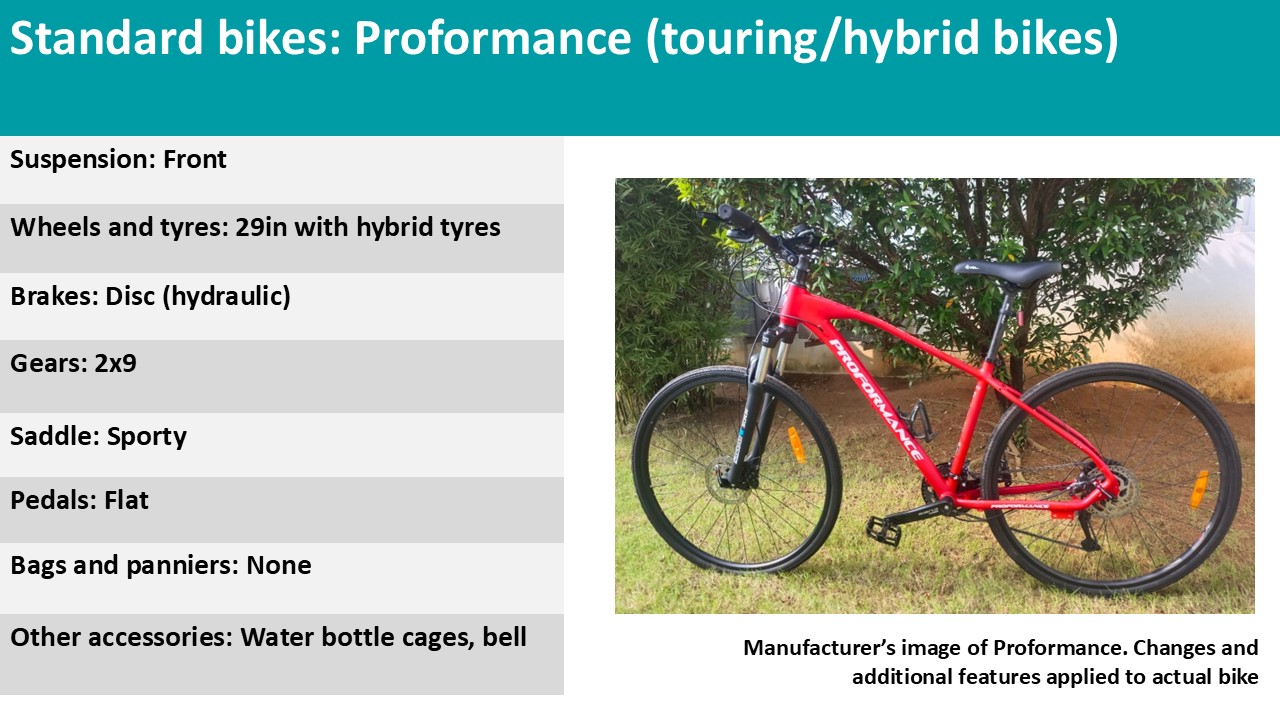
E-bikes: E-bikes are available on this trip for an additional cost and subject to availability. Read our e-bike fact sheet for more information on the e-bikes available for this cycling adventure.
Terrain and route: Almost entirely surfaced roads including plenty of quiet backroads with low levels of traffic, but traffic does increase when approaching towns. Road surfaces are mostly good. There is one sustained climb, and some undulating sections with short climbs, but the support vehicle is available if required. Longer days at the beginning of the trip are mostly flat, but always interesting. Most rides are door-to-door, allowing plenty of time in the saddle. Indian roads can be rough in some places with potholes. Please bear this in mind if you are bringing your own pedals and clip-in shoes.
Climate: It can be hot and humid in India, particularly during September-November and March-May, which can increase the difficulty of the cycling.
Monuments: The Sri Meenakshi Temple (which we visit on either Day 6 or 7) is currently preparing for re-consecration. This process includes scaffolding around the main towers to aid decoration work but does not stop us visiting and exploring the site.
Additionally, the Archaeological Survey of India (ASI) is responsible for the conservation of many monuments in India and very occasionally this may mean work is taking place at sites visited on this trip. The ASI schedule is never published so it is not possible to forewarn when work is taking place.
Group
Our Indian team of leaders has proved very popular with their incredible knowledge, passion and hospitality adding greatly to the experience. There is no better way to experience Indian culture than letting an Indian guide show you around their country.
Adult min age: 16
Min group size: 4
Max group size: 14
Itinerary

Land Only
- Start City: Chennai
- End City: Kochi (Cochin)
Land Only Itinerary
Begin your adventure in Chennai this morning, meeting the group at Chennai Airport. From here it’s a 3hr 30min group transfer to Pondicherry. We normally take a break at Mahabalipuram, home to shore temples and rock carvings. Carving in stone is still a living art here and we see stonemasons chipping away along the roadside, practicing skills that have flourished for centuries.
On arrival in Pondicherry, we have a chance to freshen up and have lunch before we assemble the bikes and explore this former French colony on a 4mi (6km) ride to Promenade Beach.
Around 6pm, we gather as a group to get to learn more about the adventures ahead over a welcome meeting. Your tour leader then arranges a group dinner at a nearby restaurant.
Want more time in Chennai or Pondicherry? Secure pre-tour hotel nights through your sales representative
Accommodation: Hotel Atithi (or similar)
We take a circular ride to Auroville, a new-age spiritual commune. Founded in 1968 by The Mother and named after her Guru Sri Aurobindo, it promises a more balanced way of living. Revitalised by some earthly fruit juices, we ride the 9mi (15km) back into town, seeing fishing communities and cycling along the promenade, which retains some Gallic charm. Depending on time, lunch may be at Auroville or in Pondicherry, and the rest of the day is free to explore.
Accommodation: Hotel Atithi (or similar)

Starting from our hotel, we either ride out of Pondicherry through bustling traffic, or we have the option to take a transfer out of Pondicherry to miss most traffic and get on our bikes on a quieter road just outside of the city. We soon leave the city bustle for quiet backroads, experiencing rural life where simple mud huts contrast with the brightly coloured saris worn by local women. In true Indian style, we stop at a roadside restaurant for a tea break, and a little later, stop for a lakeside picnic lunch. Back on our bikes, we cycle another 41mi (66km) to Chidambaram. If we have time this evening, we may visit the ancient Thillai Nataraja Temple, in the heart of the city.
Staying in the grand mansion of the village, we sleep in the extended family villa; with its own temple, it’s almost like stepping back in time.
Accommodation: Lakshmivilas Heritage Resort (or similar)
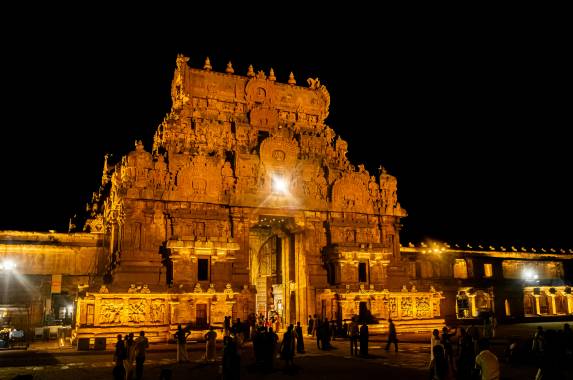
We have a scenic morning ride following quiet roads and tracks alongside the Cauvery River to Thanjavur. A capital between the ninth and 13th centuries, it regained its status under the Nayaks in the 16th century who rebuilt the Royal Palace, Durbar Hall and libraries.
After lunch at a local couple’s home, in which we eat their home-made food, we take a vehicle transfer to the Thanjavur hotel. Late afternoon, we visit the palace, which houses one of the finest collections of bronze sculptures and stone carvings in southern India, and the vegetable market at Tanjore followed by a visit to the Brihadishwara Temple, one of the largest in India and known locally as the Big Temple.
Accommodation: Hotel Parisutham (or similar)
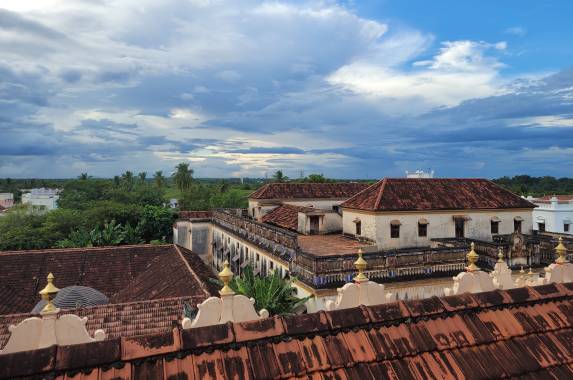
Leaving the city by the old road, often greeting and meeting friendly local people, we head into the Tamil Nadu heartland, visiting the oldest clay horse temple en route, to an area renowned for impressive mansions built by wealthy traders known as chettiars. Some of these palatial houses have been converted into boutique hotels, offering a glimpse of the past. The grand interiors of Burmese teak and elaborate plasterwork retain much of the traditional architecture of a bygone age.
Accommodation: Chettinadu Mansion (or similar)
We have a scenic ride to Madurai, passing rice fields, often greeting the local people, and stopping for tea at a roadside cafe. En route, we pass a rocky outcrop that’s said to be the sacred abode of Lord Murugan, the son of Shiva and also known as Skanda, the most revered god in Tamil Nadu.
If we have time, we visit Sri Meenakshi Temple, one of the largest temple complexes in India and one of the highlights of Tamil Nadu. Here, thousands of huge stone pillars, each adorned with different deities, are said to represent the gods of the Hindu cosmos. A constant flow of worshipers, offering pujas (rituals performed by the temple priests to the various deities) add to the heady atmosphere of incense and camphor smoke, and make this an unforgettable experience of Hindu culture.
Accommodation: JC Residency (or similar)

We have the morning to explore the old city, including Sri Meenakshi Temple if we didn’t visit yesterday, and a local vegetable market. We then leave the heat of Madurai for the cool air of the Cardamom Hills. We transfer by vehicle to our lunch stop at Theni.
After lunch, we are dropped at Cambam, from where we ride to Kumily. Hidden behind a banana plantation are the vineyards of southern India’s new venture into wine making. These give way to the forested slopes of the Western Ghats and a slow ascent through the rainforest to Thekkady, a small town close to the entrance of Periyar National Park and our accommodation for the next two nights. Reaching the peak of the climb and arriving in Kumily, we cross the invisible border into Kerala from Tamil Nadu.
Accommodation: Abad Green Forest (or similar)
Today is free to relax and explore Thekkady or, perhaps go on a guided nature walk or boat safari to the nearby Periyar National Park. Centred around a human-made reservoir, it is possible to see wildlife year-round, although the best time is the dry season (March-May) when elephants graze by the lake shore; if you are very lucky, you may even see a leopard or tiger coming down to quench their thirst. There is an optional dinner and cooking demonstration available this evening at a spice plantation home.
Please note, optional activities in Peryiar National Park must be pre-booked as early as possible due to limited availability. If you are interested in either or both the guided nature walk or the boat safari, please let your leader know within the first few days of your trip so he can secure your booking. More information and prices on optional activities are found in the Extra Expenses section of the Trip Notes.
Accommodation: Abad Green Forest (or similar)

Riding from the hotel, we cycle through cardamom and tea estates, stopping mid-morning for tea and to visit the tea factory in Vandiperiyar, learning more about the tea-making process. Refreshed, we continue along hilly tea plantation roads with plenty of short ascents and descents before we stop at a hilltop roadside cafe for a tea and snack break, which overlooks lofty peaks, tea plantations and the Sacred Heart Church Peermade.
We have a lunch break at a small roadside restaurant near Vagamon, overlooks the tea plantation hills and a small stream. The ride after lunch is through more hilly tea plantation roads, and you may spot tea pickers working in the plantations.
We end the ride with a superb winding descent on a quiet road and stay at an old plantation bungalow within the Western Ghats – a highlight for many.
Accommodation: Vanilla County Plantation homestay (or similar)
Today we ride through rubber and spice plantations en route to Kottayam, known as the Syrian Christian heartland of Kerala. Here, grand churches dot the landscape and we break at Palai to visit St Thomas Church, its whitewashed facade and distinct gilded ceiling predates its Portuguese renovation. Roads converge into Kottayam, but we avoid the city by following country roads and stop for a lunch break at Erttumanoor town.
Accommodation: Whispering Palms Lake Resort (or similar)

We have the morning to relax and enjoy the lake view. Alternatively, embark on an optional ride to the nearby Kumarakom Bird Sanctuary followed by a sightseeing ride along the lakeshore. This needs to be done early, after a quick breakfast to allow time to board our houseboats at midday for a stunning backwater cruise. The houseboats, converted rice barges, have a captain, cook and crew; we just sit back, sip long drinks and watch the world pass.
Accommodation: Houseboat
In the middle of the morning, we disembark at Muhamma. Riding along the backroad, we cross over to the coastal road to Arthingal Beach for our first view of the Arabian Sea and, finally, know we’ve cycled across India from coast to coast. We then ride to Fort Kochi for lunch.
After lunch, you may wish to visit the synagogue while in the area (please note, it is closed on Saturdays and open until 2pm on Fridays – 10am-6pm on other days). Built in 1568 for the Jewish members of Kochi’s trading communities, it is adorned with hand-painted tiles from China and elegant Belgian chandeliers, all donations from wealthy merchants. The area around the synagogue is also excellent for shopping and home to some of the last traditional lace makers, happy to demonstrate their skilled techniques and intricate designs for those interested.
We check in at the hotel after, with time to freshen up or take a dip in the pool before we can all have a farewell dinner together at a seafood restaurant overlooking the harbour.
Accommodation: The Dutch Bungalow (or similar)

We have a free day to explore Kochi, its bazaars and old harbour area at leisure. Warehouses filled with the smell of tea and spices are limewashed bright green, yellow and blue; rickety old bikes and hand-painted trucks piled high with goods fill the narrow streets; and food stalls stand on every corner. Further along the road, you’ll come to Mattancherry and the Dutch Palace. For food, try the fish market near the Chinese fishing nets, where you can buy the day’s catch and have it cooked to your taste. There are also plenty of shopping opportunities here or you can take the ferry to Ernakulam city or Vypin island.
Accommodation: The Dutch Bungalow (or similar)
The adventure ends today and we begin our return journeys home. Alternatively, if you’d like the adventure to continue, speak to your sales representative about extending your stay.
Accommodation
Hotels, houseboat and mansions

On this cycling adventure in southern India, we spend 10 nights in hotels, one night on a houseboat, two nights in heritage properties.
The accommodations typically used are on the day-to-day itinerary. However, below are a few of the notable places we stay on this trip.
Chettinad: Chettinadu Mansion (night 5)
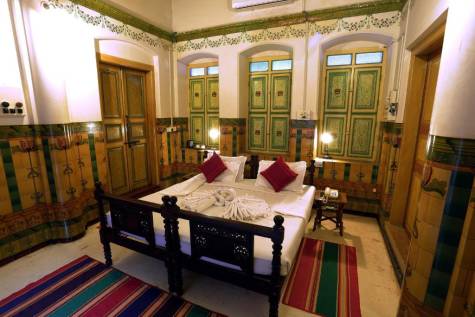
Stay in a 100-year-old property within Kandukathan, which was named a Heritage Village by the Indian government. The property gives you the experience of life in a bygone era, and extends some 80,000sqft (7,430sqm) but there are only 12 bedrooms, providing plenty of space to sprawl. The décor reflects the style of 1900s India, plus there’s an antique museum and swimming pool.
Vagamon: Vanilla County Plantation homestay (night 9)

Experience the many charms of rural Kerala with a stay at this 75-year-old Dutch-style heritage plantation bungalow in the Mavady Hills. On arrival at this family-owned boutique inn surrounded by lush hills and an abundant spice, vegetable and flower garden, we are greeted by the owners and their friendly labrador, Koffi. It also features a plunge pool amid the greenery, and a bakery and kitchen serving authentic homemade cuisine and baked goods made from locally sourced spices and ingredients. The accommodation here is spread out, so some of the group stays in the main house and others in hill-view cottages.
To Muhamma: Houseboat (night 11)
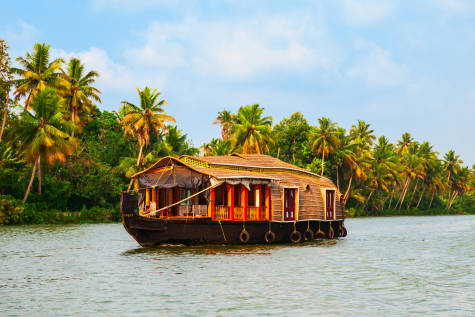
No trip to Kerala is complete without a houseboat stay. Typically, the boats are converted barges (known locally as kettuvallam), once used to transport rice from farm to market. All cabins have private bathrooms and the staff keep you well fed. The houseboats have a deck and dining area, although the style/layout varies between boats. There is a cook, driver and assistants for each boat and the food is traditional Keralan fare using local produce. Houseboats have two to five twin-bedded rooms. Larger groups may be split over several boats; however, the group reunites at riverside stops and the overnight anchor point where your leader will be available.
Worth knowing
- The single supplement does not include the night at the Vanilla County Plantation on Day 9 and cannot be guaranteed on the houseboat due to limited rooms.
- Hotels in India usually do not have heating as there are really only a couple of months in the year when the weather can get cooler. You can, however, request more blankets or the hotel may be able to provide a standing heater for your room. Please talk to your tour leader if you need help in this matter.
Single supplement from £ 655
Food & Drink
All breakfasts, 11 lunches and eight dinners are included.
Lunches on riding days are usually in roadside cafes, allowing us to sample typical south Indian dishes such as poori (deep-fried bread served with curry) and dosa (thin pancakes made with fermented rice and lentil batter). South Indian food is heavily influenced by the tropical landscape; creamy coconut dishes enlivened with delicate spices, served on a banana leaf. It’s also an ideal destination if you are vegetarian. Tea and soft drinks are very cheap but a (large) bottle of beer is approximately 410 rupees (US$5). Please note, due to Kerala state laws, alcohol licences are limited to one or two bars in each area and not all hotels are permitted to serve alcohol. The first day of every month and certain holidays in India are dry days, when no alcohol is permitted for sale.
Generally, you can eat out very cheaply in India. Where food is not included, your tour leader can provide recommendations. Allow at least 1,650 rupees (approximately US$20) per day for lunch and dinner. You can eat out very cheaply in India, but if you mainly eat at the more expensive restaurants, you will spend more than the suggested amount.
Please note, service in restaurants can be quite slow.
Drinking water is provided in the support vehicle, where you can fill your bottle from the containers.
Transport
All your luggage and personal belongings are carried by the support vehicle. Transfers are done in the support vehicle or a separate vehicle depending on the group size. The support vehicle follows the riders most of the time, allowing you to cycle as much or as little as you like. The whole group can be accommodated at all times. On occasions, it is not possible for the support vehicle to follow the group, but we still meet the vehicle at regular intervals to replenish water supplies etc.
Weather & Seasonality
The most important feature of the Indian climate is the monsoon. The main monsoon strikes the Kerala coast in late May and sweeps northward over the next month or so. The ideal time to visit is during the dry season from October to March, but monsoons have been known to be late and it can rain as late as November. Days are hot and the nights warm: average maximum daytime temperatures are 21C-35C (70F-95F) and 6C-20C (43F-68F) at night. However, in the hills, temperatures can be considerably cooler. Expect temperatures just above freezing point at night. Also expect frequent rainstorms on November departures. These are usually quite short and the sun normally comes out fairly quickly afterwards.
Joining Instructions
Key information
Start hotel: Hotel Atithi, 126, Sardar Vallabhai Patel Salai, Heritage Town, Puducherry, 605001, India
Phone: +91 90877 38989
Recommended arrival time: We recommend you arrive or are at the airport in Chennai in time to join the group transfer. If not, please be at the hotel in Pondicherry for 1pm to meet up with the group. There will be a welcome briefing around 6pm this evening.
Airport: Chennai International Airport (MAA)
Getting to the start hotel
The start hotel is approximately two hours to 3hr 30min drive from the airport. Exodus provides one group arrival transfer from the airport, which is timed to coincide with the arrival of a chosen flight from London, UK. You may join this transfer, provided you can be at the airport before the transfer leaves. Speak to your sales representative for the group arrival transfer times or to arrange a private transfer.
Catching your return flight
There’s a group departure transfer to the airport for customers who Exodus booked onto a chosen flight to London, UK. Please speak to your sales representative if you wish to join. If the group departure transfer does not suit your flight time, speak to your sales representative to arrange an alternative transfer.
Full joining instructions including local emergency numbers will be sent to you as part of our Final Joining Instructions. If you do not receive these at least a week before departure, or require them earlier please contact our office or your travel agent.
Location start: Chennai
Location end: Kochi (Cochin)
What To Take
Essential Equipment
- High-factor sunscreen
- Warmer layers for the evenings in the hills
- Cotton trousers (pants)
- Energy snacks
- Water bottle – this should be a standard size to fit into a normal water bottle cage on the bike
- Alternative option to water bottle is a water bladder (also known as a hydration pack/CamelBak)
Cycling clothing
For this cycling trips we recommend:
- Padded cycling shorts: For destinations with more modest cultures, we also recommend loose ‘over-shorts’ for riding or rest stops
- Eyewear: Either sunglasses or eye protection with clear lenses to protect the eyes while riding
- Cycling gloves: Especially for riding off-road or on rugged surfaces
- Cycling shoes: Cycling is more efficient with stiff-soled shoes. We don’t recommend open-toed shoes or sandals
- Small close-fitting backpack or bum bag (fanny pack): To keep spare clothing or essential items to hand during the ride
- Cycle helmet
- Front and rear helmet lights (for days where there’s low visibility due to weather or heavy traffic)
- Waterproof cycling gear (if your trip falls within monsoon season)
There are opportunities to get laundry done locally at a very affordable price so fine to pack light, mainly on Day 7 and Day 12.
Equipment Hire
Included standard bike
The standard bikes for this trip are Proformance bikes.
We will take your height at the time of booking to reserve equipment. If you have a preferred bike size, please request when booking.
E-bike upgrade
Electric bikes are available on this trip; prices from £175/US$245/335 Canadian dollars. Speak to your sales representative for more information.
Please note, e-bikes available in India have a rear hub mounted motor (rather than mounted in the centre). For steep climbs, they may be of limited assistance but will perform well on plains or low-grade undulations.
Bringing your own bike
If you’d prefer to bring your own bike, please advise us at the time of booking and you will receive a discount on the price of the trip. However, you will be responsible for any extra baggage charges; assembling and disassembling your bike; and bringing along spare parts and any tools specific to it. You should also ensure you have adequate insurance to cover loss, damage or theft.
Accessories and clothing
Bringing equipment from home
You’re welcome to bring your own equipment, such as SPD pedals or clipless pedals, your own saddle (excluding the seat post), or gel saddle cover for the hire bikes. Your leader will help you fit these when bikes are distributed.
Helmets
Helmets are mandatory for everyone on a guided Exodus cycling trip. You must bring your own as, following best safety practice, they are not available for hire.
Prohibited items to travel with in India
- The Indian government has banned e-cigarettes and related products. You can’t buy e-cigarettes in India or bring them into the country. Please ensure you do not pack these in your luggage.
- Satellite communications devices, for example (but not exclusively) Garmin inReach or any other brand GPS tracking device, are illegal in India without a license. Please do not bring them with you.
Practical Information
Visa
India
To avoid possible problems at immigration, make sure your passport is valid for a minimum of 180 days at the time of entry into India.
Travellers from the UK, US, CA and EU normally need a visa to enter India. Please note, visa requirements often change and it is your responsibility to obtain any required visas for this trip. Therefore, we recommend that you check with the nearest embassy or consulate of your chosen destination(s), including any countries you may be transiting or transferring through.
Some local governments provide guidance on what visas their citizens need. To help, we’ve gathered a selection of useful links below.
• Australia: www.smartraveller.gov.au/destinations/asia/india
• Canada: www.travel.gc.ca/destinations/india
• United Kingdom: www.gov.uk/foreign-travel-advice/india/entry-requirements
• USA: www.travel.state.gov/content/travel/en/international-travel/International-Travel-Country-Information-Pages/India.html
Travellers eligible for an e-visa, which includes those from the UK, US, CA and EU, can apply at www.indianvisaonline.gov.in/evisa/tvoa.html.
For more information on applying for your Indian visa, please click on this link: Indian Visa Information
New Digital Arrival Card
Travellers from the UK, US, EU and Canada must also complete a Digital Arrival Card. This can be filled online up to 72 hours before arrival via the official Indian visa website https://indianvisaonline.gov.in/earrival/. This is separate from the Indian e-visa process and this remains the same. Physical cards will remain at the arrival airport until 1 April 2026, at which point the Digital Arrival Card will be made mandatory.
Vaccinations and Health
India
You require a yellow fever vaccination certificate if arriving from a country with risk of yellow fever transmission. Proof of a polio vaccination may also be required by some visitors. Please confirm all requirements and recommendations with your doctor or travel clinic.
You may also want to consider vaccinations for tetanus, hepatitis A, typhoid, cholera, hepatitis B, Japanese encephalitis, rabies and tuberculosis. The risk of malaria is slight, but you may wish to consult your doctor or travel clinic for further advice.
Additionally, dengue fever and chikungunya are known risks in India. Both are tropical viral diseases spread by daytime biting mosquitoes. There is currently no vaccine or prophylaxis available for either, and therefore the best form of prevention is to avoid being bitten. We recommend you take the usual precautions to avoid mosquito bites.
Some of our India trips spend time at altitude. In regions over approximately 6,560ft (2,000m), there is little risk of mosquito-borne diseases. For trips above 9,840ft (3,000m), there is a risk of being affected by acute mountain sickness. Our itineraries are designed to enable everyone to acclimatise to these altitudes, but you should be aware that it is still possible for you to be affected. Please see the Trip Notes for further information.
The risk of malaria on this trip is slight, but you may wish to consult your GP or travel health clinic for further advice.
The Travel Health Pro website recommends to have a rabies vaccination on this trip, as cycling is considered a higher risk activity.
Local Time
India's time zone: Asia/Kolkata (UTC +05:30)
Electricity
India's electricity: Plug types C (two round pins), D (three round pins) and M (three round pins) – 230V, 50Hz
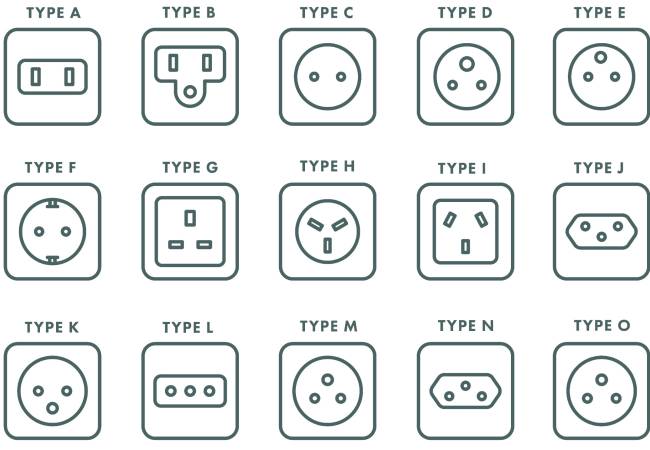
Money
India's currency: Indian rupee (INR). Please note, it is illegal to import or export rupees. Do not accept torn or very dirty Indian banknotes from banks or in change as they will almost certainly not be accepted as legal tender in India. You can normally change money back from rupees into US dollars or British pounds at the departure airport, but you must produce an exchange receipt showing that you changed money in India.
ATM Availability
ATMs are widely available throughout this trip (Visa and Mastercard are best). However, you should not rely on these 100 percent of the time, so bring cash too. Please inform your bank before departure that you are travelling to India and carry the relevant telephone number with you in case they block your card.
You can pay with credit cards in bigger shops all over India. You can bring British pounds or US dollars, but travellers cheques are often difficult to exchange.
Extra Expenses & Spending Money
Many sites now charge a small fee for camera use. Allow at least 600 rupees (approximately US$7) per day for personal expenditures, such as snacks and soft drinks.
India has very good shopping opportunities, especially for locally made goods. During your trip, it is highly likely your local guides will take you to emporiums and workshops where these goods are made. Many people find this a great opportunity to buy local handicrafts, silk, jewellery and carpets. Guides often assume visitors want to go shopping, it is very much part of the culture, but if you do not wish to go, please make this clear to your local guide at the time.
Optional activities
Thekkady:
- 45-minute Ayurvedic massage: Approximately 2,500 rupees (US$30) per person
- Kathakali performance: 300 rupees (US$3.50) per person
- Kalaripayattu martial arts performance: 300 rupees (US$3.50) per person
- Periyar National Park boat safari: 550 rupees (US$6.50) per ticket, plus 530 rupees (US$6) entrance fee
- Periyar National Park nature walk: 2100 rupees (US$25), based on a group of up to four people, plus 530 rupees (US$6) entrance fee
- Spice plantation tour: 150 rupees (US$1.50) per person
- Optional dinner and cooking class experience: 1,200 rupees (US$14) per person
Kottayam:
- Kumarakom Bird Sanctuary entry fee (Day 11): 200 rupees (US$2.50) per person
Fort Kochi:
- Kathakali dance show: 700 rupees (US$9) per person, based on a minimum of four people
Tipping
Tipping is part of the culture in India. Your tour leader will offer to arrange and look after a tipping kitty, which will be used to tip hotel staff, local guides, airport transfer drivers and other support staff used on the trip.
Your leader will suggest how much to contribute, depending on group size, but it is usually around 5,700-6,300 rupees (US$70-US$76) per person. At any time during the trip, your leader will happily show you an account of how the kitty is being distributed.
Tips for the leader, drivers and cycle crew are not included in the kitty and are at your own discretion. Our local leaders and staff are paid fairly for their work; however, if you wish to show your appreciation, our recommendation is as follows:
- For the driver, assistant leader and mechanic: Around 500 rupees (approximately US$6) per passenger, per day
- For your leader around 400-500 rupees (approximately US$5-US$6) per person, per day
It is preferable to tip in local currency where possible.
Sustainability and Impact
As a certified B Corp, we’re on a mission to improve our social and environmental impact across all our adventures.
We do this through our innovative Thriving Nature, Thriving People plan.
This ‘nature positive’ approach is designed to help nature and communities thrive in harmony through practical solutions, such as reducing carbon and waste on our trips, supporting conservation projects through the Exodus Adventure Travels Foundation, and rewilding 100 square metres for every Exodus traveller.
You’ll also find Thriving Nature, Thriving People moments across our trips. These experiences are often a highlight of your adventure, while also benefiting the natural world or local communities.
On this trip, we:
- Share a home-cooked meal with a local couple in Thanjavur, supporting household income while learning about everyday life.
- Stay at the Vanilla County Plantation homestay in Kerala, supporting locally run accommodation within a working plantation.
- Optionally join a cooking demonstration and dinner at a spice plantation home in Thekkady.
Important Information
Your Safe Participation
When booking this trip, you should be confident in your ability to participate in all activities described in these Trip Notes. If you have any doubt about your suitability, please call us and ask to speak to one of the experts on this itinerary.
Although our leaders are well trained to deal with different capabilities, if they have any concerns about someone’s ability to safely take part in an activity, or their impact on other people’s enjoyment, we authorise them to take necessary action which, in some circumstances, may involve asking someone to miss that activity.
By booking this trip you agree to our Booking Conditions which clearly state that our leaders have the authority to do this. In these rare instances we will ensure anyone sitting out is safely provided for and offered alternative options where possible. Refunds will not be provided for activities missed and customers may be liable for additional costs incurred.
Seatbelts
All vehicles used by us should be equipped with working seatbelts, except where approved by us based on the vehicle type or journey. Wherever seatbelts are available, we require our customers to use them for their own safety, even where it may not be a legal requirement.
Travel Safety
For additional information please have a look at the travel safety advice page on our website.
How to Book
Speak to our friendly team of experts to plan your adventure:
- Check availability: our website shows real-time availability of our guided group tours, or contact our team by phone, email or live chat.
- Hold a space: You can provisionally hold a space on any guided group tour to give you time to finalise your travel plans.
- Confirm your booking: Payment of a deposit will complete your booking and secure your place on the trip.
After booking
You will receive a confirmation document and invoice, which includes extra information and guidance about your travel arrangements. Our dedicated Customer Operations team will help you with any pre-travel questions or arrangements and can easily add extensions or extra accommodation to your booking. Final Joining Instructions will usually be sent out two to three weeks prior to departure.
Adding transfers to your booking
If you have arranged your own flights and would like to add transfers to your booking, please provide your arrival and departure details to our Customer Operations team around four to six weeks before departure.
- Where free transfers are included, they are available for any flight but can only be added to your booking once we have received your flight schedule.
- Where group arrival and departure transfers are available, these operate at fixed times. You will need to arrive in time to meet the scheduled transfer. If the timings don’t align with your travel plans, our team can arrange private transfers once they receive your flight schedule.
Trip Note validity
Trip notes may be updated after booking; if any updates significantly impact the inclusions or itinerary you will be advised in writing. A link to the most up-to-date Trip Notes will be sent out with your Final Joining Instructions before departure.
The information in these Trip Notes is given in good faith. All holidays can be subject to unexpected changes, and occasionally it may not be possible to follow the itinerary as planned. In these circumstances we will make the best-possible alternative arrangements that maintain the integrity of the original itinerary.

